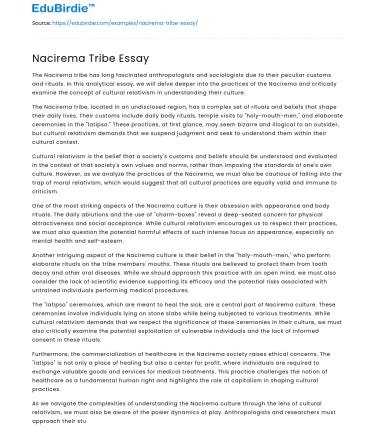The Nacirema tribe has long fascinated anthropologists and sociologists due to their peculiar customs and rituals. In this analytical essay, we will delve deeper into the practices of the Nacirema and critically examine the concept of cultural relativism in understanding their culture.
The Nacirema tribe, located in an undisclosed region, has a complex set of rituals and beliefs that shape their daily lives. Their customs include daily body rituals, temple visits to "holy-mouth-men," and elaborate ceremonies in the "latipso." These practices, at first glance, may seem bizarre and illogical to an outsider, but cultural relativism demands that we suspend judgment and seek to understand them within their cultural context.
Save your time!
We can take care of your essay
- Proper editing and formatting
- Free revision, title page, and bibliography
- Flexible prices and money-back guarantee
Cultural relativism is the belief that a society's customs and beliefs should be understood and evaluated in the context of that society's own values and norms, rather than imposing the standards of one's own culture. However, as we analyze the practices of the Nacirema, we must also be cautious of falling into the trap of moral relativism, which would suggest that all cultural practices are equally valid and immune to criticism.
One of the most striking aspects of the Nacirema culture is their obsession with appearance and body rituals. The daily ablutions and the use of "charm-boxes" reveal a deep-seated concern for physical attractiveness and social acceptance. While cultural relativism encourages us to respect their practices, we must also question the potential harmful effects of such intense focus on appearance, especially on mental health and self-esteem.
Another intriguing aspect of the Nacirema culture is their belief in the "holy-mouth-men," who perform elaborate rituals on the tribe members' mouths. These rituals are believed to protect them from tooth decay and other oral diseases. While we should approach this practice with an open mind, we must also consider the lack of scientific evidence supporting its efficacy and the potential risks associated with untrained individuals performing medical procedures.
The "latipso" ceremonies, which are meant to heal the sick, are a central part of Nacirema culture. These ceremonies involve individuals lying on stone slabs while being subjected to various treatments. While cultural relativism demands that we respect the significance of these ceremonies in their culture, we must also critically examine the potential exploitation of vulnerable individuals and the lack of informed consent in these rituals.
Furthermore, the commercialization of healthcare in the Nacirema society raises ethical concerns. The "latipso" is not only a place of healing but also a center for profit, where individuals are required to exchange valuable goods and services for medical treatments. This practice challenges the notion of healthcare as a fundamental human right and highlights the role of capitalism in shaping cultural practices.
As we navigate the complexities of understanding the Nacirema culture through the lens of cultural relativism, we must also be aware of the power dynamics at play. Anthropologists and researchers must approach their study of the Nacirema with humility and respect for their autonomy and agency. The act of observing and analyzing their customs can inadvertently influence and alter their practices, a phenomenon known as the observer effect.
In conclusion, the Nacirema tribe offers a fascinating case study in cultural relativism. As we seek to understand and appreciate their customs, we must also maintain a critical perspective that allows us to question harmful practices and protect the well-being of individuals within their society. The concept of cultural relativism should not be a shield to justify harmful practices but rather a tool to foster cross-cultural understanding and empathy. By critically analyzing the practices of the Nacirema, we can engage in a more nuanced and respectful dialogue about cultural diversity and the universal values that unite us as human beings.






 Stuck on your essay?
Stuck on your essay?

